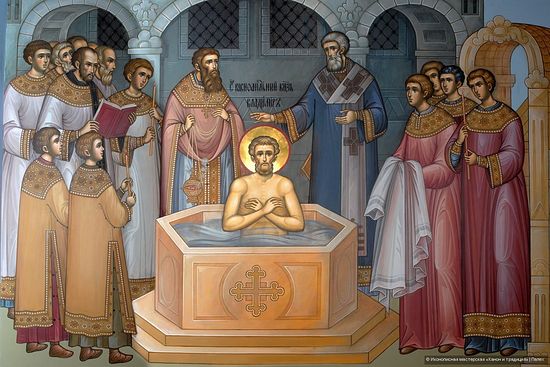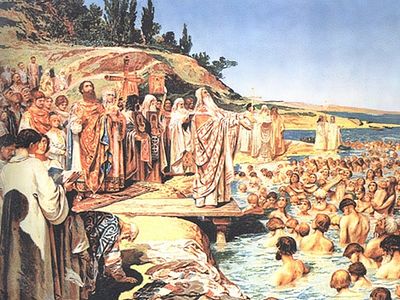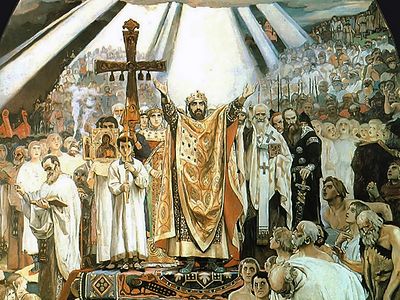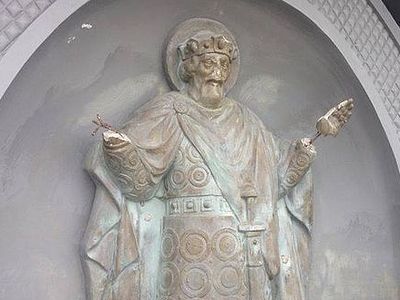Ancient Russian chroniclers called Prince Vladimir equal-to-the-apostles, for his podvig was on the same scale as that of the apostles: an entire, vast country was enlightened with the light of the Christian faith through his efforts. Nevertheless, then as now there are those who aren’t pleased with Prince Vladimir’s choice. They suppose that if Vladimir had chosen not Orthodoxy, but for example Judaism or Islam, life would be easier for the Russians. A correspondent for Pravoslavie.ru asked Archpriest Artemy Vladimirov and Archimandrite Alypy (Svetlichny) what they thought it would be like if St. Vladimir has chosen a different faith.
For him the faith became something unlike anything else. It was more precious than air, the sun’s rays, food or drink
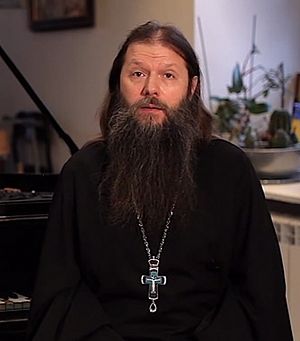
—Today’s people, who have resigned themselves to the name, “consumer” and “average person”, cannot even imagine what Prince Vladimir’s heart lived by when he was in his phase of a torturous search for faith, desiring to find some meaning for his life, and he sought out spiritual teachers to follow. Very few know that even from his earliest years, as he listened to the stories of his pious grandmother, St. Olga, the future Grand Prince of a great nation became lost in thoughts about service to the almighty Creator of heaven and earth. Apparently the time had not yet come. Faith for him became something unlike anything else. It was more precious than air, the sun’s rays, food or drink. As an ingenious ruler, strategist, and merciful master responsible for thousands of souls, it became clear to him at a certain moment that a sovereign nation could not develop and Kievan Rus’ could not become strong upon the foundation of paganism accompanied by its unbridled passions and division into many different tribes. Therefore Prince Vladimir, as is stated in his Life, listened attentively as each preacher and teacher of different faiths stated his respective case.
I consider it superfluous to answer the question: Wouldn’t it have been better to go without any religion at all? Plutarch, a historian of ancient times, has already answered this question. He wrote in his book: “I have observed many peoples and kingdoms, but I have not found a single tribe that has not in some form or another expressed its veneration of God, did not serve Him, or pray to Him in a language understandable to them.”
Only the modern average person, having departed through the looking glass of a computer screen, can suppose that religion impoverishes the human soul. To the contrary, it is precisely religion as worship of God that restores human dignity, gives him the moral strength to perform his rational service to others, and prevents him from bowing down to sin and vice; after all the latter is the inescapable lot of every cynic.
Reading the life of St. Vladimir, we see that he systematically turned down Talmudic Judaism and Mohamedanism, as well as Roman Catholicism, which had finally fallen away from Orthodoxy in the ninth century. From the text itself is seen that for Prince Vladimir, who perhaps did not yet have a grasp on theological subtleties, the esthetical factor was very significant. The Slavic race, endowed by God with a sense of beauty and an understanding of harmony, was won over by the divine services in the great Hagia Sophia in the person of his emissaries to Constantinople, for they “did not know where they were—in heaven, or on earth.” Their colorful tale of the magnificent temple, of the beautiful singing, the splendor of the services themselves, had already predisposed the perspicacious prince in favor of Byzantine Orthodoxy.
Neither the Judaic leaders’ dreary lamentations, nor the Moslems’ prayers, nor the psychological pressure of the western preachers could draw the prince to their side. But the icon of the Last Judgment brought by the Greeks to Kiev with the explanation of mankind’s ultimate fate, the Sermon on the Mount and Christ’s Gospel of the six works of Christian mercy—feeding the hungry, giving drink to the thirsty, clothing the naked, sheltering the homeless, comforting the sick, and visiting the imprisoned—found resonance in the heart of the Kievan chieftain, as his contemporaries called their ruler.
Later St. Vladimir manifested such a remarkable change in his life after having renounced the remnants and excesses of his former pagan period that the Greek priests considered it necessary to damp down the ruler’s fire of Christian piety, persuading him not to let all the bandits out of the prisons, pointing out the grievous social consequences of such monarchal mercy.
Why then do we glorify holy Prince Vladimir as equal-to-the-apostles? Because he is the progenitor and spiritual father of the Russian[1] nation. His prayer pronounced over the shores of the Dnieper River during the mass baptism of Kievans has shown its influence over the following centuries. And now, when Kievan Rus’ is experiencing one of the most dramatic moments of its history, when its leader has turned to the West that has long been living in the darkness of neo-paganism, we believe that the thousand-year roots of this land, which unites Great, Little, and White Russia, will not dry up, but will send forth fresh shoots. We believe that, albeit not without sorrows, tears, and blood, a sobering up of part of the Ukrainian nation will happen, and will once more remember its historical calling, its Slavic mission: to remain in inseparable unity with all the other Orthodox Slavic peoples; for our undivided Fatherland, as His Holiness Patriarch Kirill recently stated, is a reflection of the Holy Trinity. So also, our three nations, each having its own independent status and local culture, are in essence one Orthodox people, and this is all thanks to the efforts of holy Equal-to-the-Apostles Prince Vladimir, whose memory we have celebrated and will celebrate with gratefulness to him as our father according to the flesh, and according to the spirit.
***
“The spiritual component is a sure option for uniting peoples”
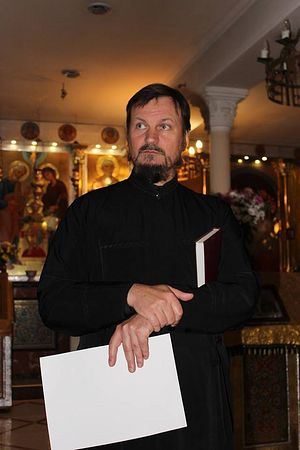
—Prince Vladimir’s choice was bound up with very many different factors. It was geopolitical, an opportunity to build a relationship with the imperial house of Constantinople, and of course, a spiritual call. Note that the Greek religion had entered forcefully and stably into the life of ancient rusichi [an old word for the Slavic peoples of Rus’], and those had nothing against the presence of Christian churches in their cities. “Local” pagans were most likely mostly peaceful in their performance of pagan rituals. Only the “imported” gods such as Perun demanded human sacrifice. It is possible that this even caused infighting among the priests of the Kiev pantheon. Otherwise, the prince would not have sought out another religion for his people. In creating a new state, the great prince thought about how he might unify the different tribes. The surest option at the time was precisely the spiritual component.
Why Orthodoxy? First of all, because Prince Vladimir’s grandmother, Olga, had received Christ in Constantinople. Secondly, Constantinople and Greek Tauride were near trade neighbors. At the same time there were outrages happening in Rome with the popes—scandals, and loss of spiritual authority. Judaism was spoiled in the Prince’s estimation in the person of the Khazars. Islam was still too young and aggressive, and the prince needed stability in the country.
The choice happened most likely serendipitously. The emissaries’ esthetic exaltation at the Greek Church services decided the matter. The prince went to be baptized. Not only to receive Christianity, but to take it by force as was his habit. In the same way he had earlier created the pantheon of gods in Kiev, taking them from various indigenous tribes. Possibly the Christian icon could have stood among the pagan idols! But God acted according to His Providence, and the prince was overcome by blindness. Therefore Vladimir entered Chersonese without the traditional pillaging, and the baptismal font—with humility.
Along with the prince, Rus’ also began to see. And although it still does not see everything clearly, it nevertheless stands near to God, and that is why it was named, “Holy Russia”!
Well, and if someone today wants the country to have a different fate by means of a new religion, he is late by about a thousand years—the choice has already been made. And our Orthodox peoples have made their contribution to the cultural treasure house of the world by their unique art, penetrated with the Orthodox confession of faith; into the wisdom of the world have entered the teachings of great ascetics of the Church; and discussions about the mystery of the human soul are based upon the works of great Russian writers, who lived in the Orthodoxy traditions.
That artful opportunists of the western world have used to their own advantage many achievements of some clever Russians, both homespun and learned, is another subject.
So that is how it happened, the prince heeded his own heart, his soul drew him to the world of God’s beauty, and the blindness gave him the opportunity to look attentively within and be convinced that he had chosen the right faith.
Whoever criticizes him would do well to step away from empty temptation and live first in the quietude of his own heart, having known the greatness of Orthodoxy; and be convinced not only of its truth, but also of its promising future.
[1] The term “Russian” here includes what is today called Ukrainian, Belorussian, and other Orthodox people in their sphere of influence.
